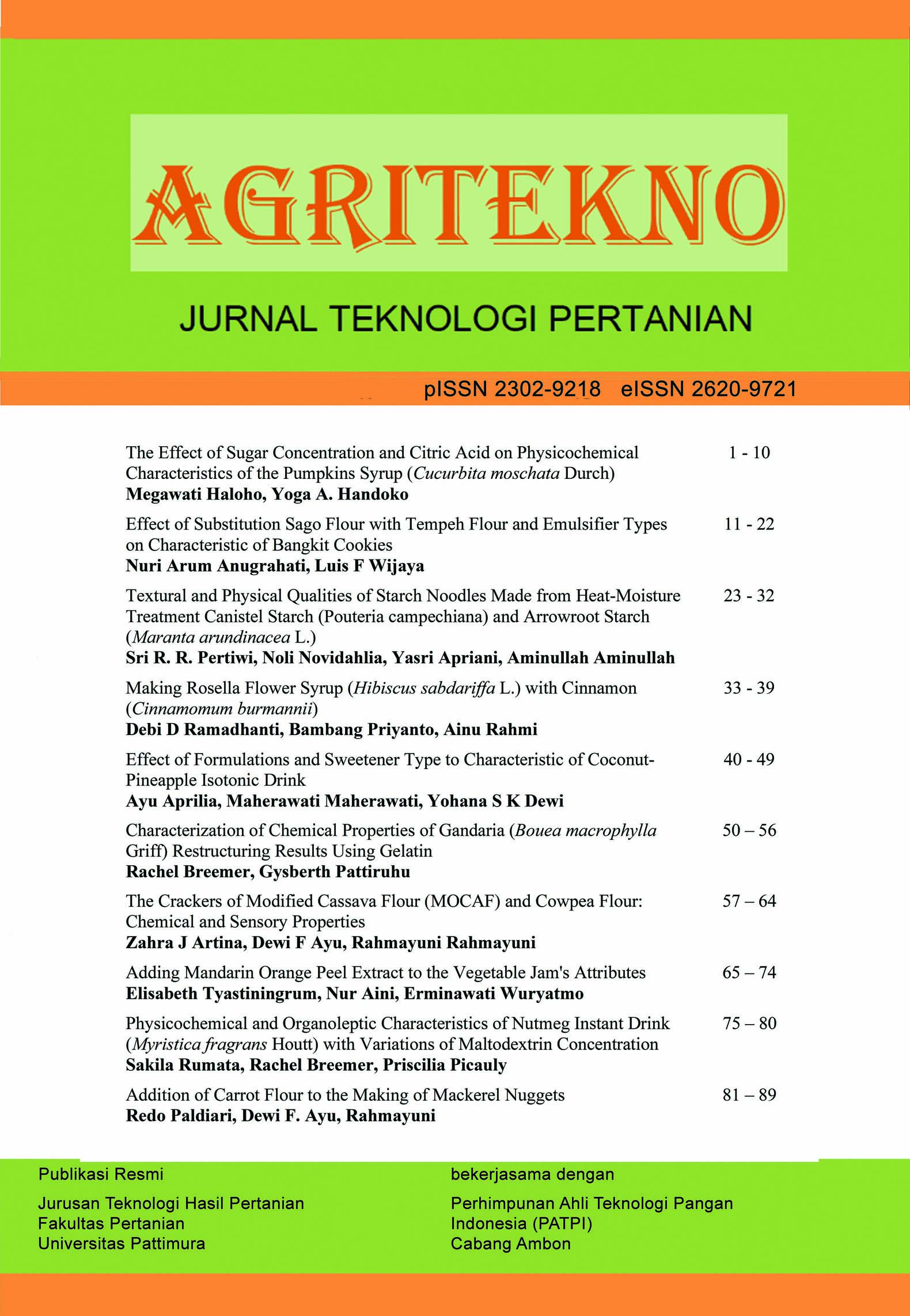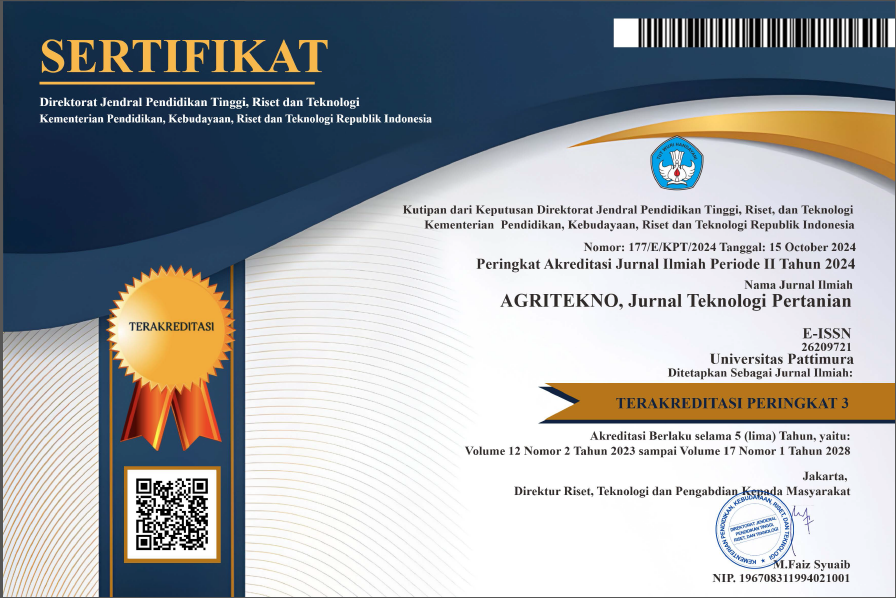Adding Mandarin Orange Peel Extract to the Vegetable Jam's Attributes
Abstract
Indonesians still do relatively little to prepare and consume veggies. Products made from vegetable raw materials that have the potential to be developed is a jam. Making vegetable jam with a combination of several types of vegetables can make the flavor of the jam less favorable. So, efforts are required to add mandarin orange peel extract, which includes essential oils and possibly intense limonene components as a taste, to make up for the deficits arising from the flavor aspect and enhance the intrinsic quality of the jam. This study sought to identify the best treatment and compare it to a control, as well as the effect of adding orange peel extract and the difference in concentration added to the sensory properties of vegetable jam. It also sought to identify the best treatment and examine vegetable jam's physicochemical and microbiological properties. This study employed a factorial, totally randomized design as its methodology. Mandarin orange peel extract treatment without encapsulation (E1) and encapsulated orange peel extract made up the first factor (E2). The concentration that was added to the vegetable jam, consisting of 0.5% (K1), 1% (K2), 1.5% (K3), 2% (K4), and 2.5%, is the second factor (K5). According to the analysis of variance, adding orange peel extract in varying concentrations greatly affected the aroma, taste, and overall preference. Still, it had no discernible impact on the color characteristics or lubricating power. The E2K4 treatment produced the greatest results for the sensory properties of the jam when compared to controls using a paired T-test. This significantly changed overall preference, water content, water activity, antioxidant activity, pH, and TPC. Yet, it had little impact on color saturation.
Downloads
References
Adiamo, O. Q., Ghafoor, K., Al-Juhaimi, F., Babiker, E. E., & Mohamed Ahmed, I. A. (2018). Thermosonication process for optimal functional properties in carrot juice containing orange peel and pulp extracts. Food Chemistry, 245(1), 79–88. https://doi.org/10.1016/J.FOODCHEM.2017.10.090
Aliya, R., & Nurhabidah, T. (2021). Formulasi dan evaluasi granul effervescent sari buah jeruk keprok (Citrus reticulata Blanco). Jurnal Permata Indonesia, 12(2), 12–15.
Angelina, G., Tyastiningrum, E., Sitorus, E. M., & Aini, N. (2021). Encapsulation of mandarin peel simplicia powder and extract and its application on vegetables jam. Agroteknologi, 15(02), 166–181.
AOAC. (2005). Official Methods of Analysis of the Association of Official Agricultural Chemists International. Journal of the Association of Official Agricultural Chemists, 41, 12.
Ashfia, F., Adriane, F. Y., Sari, D. P., & Rusmini. (2019). Formulasi dan uji aktivitas antibakteri sediaan footspray anti bau kaki yang mengandung ekstrak kulit jeruk nipis dan ampas kopi. Indonesian Chemistry and Application Journal, 3(1), 28–33. https://doi.org/10.26740/ICAJ.V3N1.P28-33
Balitbangkes RI. (2019). Riset Kesehatan Dasar: RISKESDAS. Balitbang Kementrian Kesehatan Republik Indonesia.
BSN. (2008). SNI 3746-2008. Selai Buah. (p. 8).
Cahyati, S., Kurniasih, Y., & Khery, Y. (2016). Efiisiensi isolasi minyak atsiri dari kulit jeruk dengan metode destilasi air-uap ditinjau dari perbandingan bahan baku dan pelarut yang digunakan. Hydrogen: Jurnal Kependidikan Kimia, 4(2), 103–110. https://doi.org/10.33394/HJKK.V4I2.97
Dewi, A. D. R. (2019). Aktivitas antioksidan dan antibakteri ekstrak kulit jeruk manis (Citrus sinensis) dan aplikasinya sebagai pengawet pangan. Jurnal Teknologi dan Industri Pangan, 30(1), 83–90. https://doi.org/10.6066/JTIP.2019.30.1.83
Fitriana, N., & Jayuska, A. (2014). Aktivitas antibakteri ekstrak etanol buah asam kandis (Garciniadiocia blume) yang terenkapsulasi maltodekstrin. Jurnal Kimia Khatulistiwa, 3(1), 7–11.
Handarini, K. (2016). Potensi ekstrak bunga Rosella (Hibiscus sabdariffa L.) sebagai pewarna dan pengawet alami pada jelly jajanan anak. Heuristic, 11(02), 32–42. https://doi.org/10.30996/HE.V11I02.617
If’all, Mappiratu, & Kadir, S. (2018). Pemanfaatan pangan lokal untuk produksi tortilla fungsional berbasis labu kuning. Jurnal Pengolahan Pangan, 3(2), 50–59. https://doi.org/10.31970/PANGAN.V3I2.15
Ishwarya, S. P., Anandharamakrishnan, C., & Stapley, A. G. F. (2015). Spray-freeze-drying: A novel process for the drying of foods and bioproducts. Trends in Food Science & Technology, 41(2), 161–181. https://doi.org/10.1016/J.TIFS.2014.10.008
Jokić, S., Molnar, M., Cikoš, A. M., Jakovljević, M., Šafranko, S., & Jerković, I. (2019). Separation of selected bioactive compounds from orange peel using the sequence of supercritical CO2 extraction and ultrasound solvent extraction: optimization of limonene and hesperidin content. Separation Science and Technology 55(15), 2799–2811. https://doi.org/10.1080/01496395.2019.1647245
Jorge, N., da Silva, A. C., & Aranha, C. P. M. (2016). Antioxidant activity of oils extracted from orange (Citrus sinensis) peel. Anais Da Academia Brasileira de Ciências, 88(2), 951–958. https://doi.org/10.1590/0001-3765201620140562
Julaeha, E., Puspita, S., Wahyudi, T., Nugraha, J., & Eddy, D. R. (2020). Mikroenkapsulasi minyak atsiri jeruk nipis dengan koaservasi kompleks yang beraktivitas antibakteri untuk aplikasi pada bahan tekstil. Arena Tekstil, 35(2), 67–76. https://doi.org/10.31266/AT.V35I2.6607
Kania, W., Andriani, M. M., & Siswanti. (2015). Pengaruh variasi rasio bahan pengikat terhadap karakteristik fisik dan kimia granul minuman fungsional instan kecambah kacang komak (Lablab purpureus (L.) sweet.). Teknosains Pangan, 4(3), 16–29.
Khasanah, L. U., Anandhito, B. K., Rachmawaty, T., Utami, R., & Manuhara, G. J. (2015). Pengaruh rasio bahan penyalut maltodekstrin, gum arab, dan susu skim terhadap karakteristik fisik dan kimia mikrokapsul oleoresin daun kayu manis (Cinnamomum burmannii). AgriTECH, 35(4), 414–421. https://doi.org/10.22146/AGRITECH.9325
Mutia, K. A., & Yunus, R. (2016). Pengaruh penambahan sukrosa pada pembuatan selai langsat. Jurnal Technopreneur, 4(2), 80–84. https://doi.org/10.30869/jtech.v4i2.57
Praseptiangga, D., Aviany, T. P., & Parnanto, N. H. R. (2016). Pengaruh penambahan gum arab terhadap karakteristik fisikokimia dan sensoris fruit leather nangka (Artocarpus heterophyllus). Jurnal Teknologi Hasil Pertanian, 9(1), 71–83. https://doi.org/10.20961/jthp.v9i2.12858
Pratiwi, A., & Nuryanti. (2017). Studi kelayakan kadar air, abu, protein, dan timbal (Pb) pada sayuran di pasar sunter, jakarta utara, sebagai bahan suplemen makanan. Indonesia Natural Research Pharmaceutical Journal, 2(2), 67–78. https://doi.org/10.52447/INSPJ.V2I2.1910
Putri, W. D. R., Nasution, A. T., Tiffani, M. H., & Wardana, A. (2021). Optimasi konsentrasi pelarut dan waktu ekstraksi pektin kulit jeruk manis (Citrus sinensis) dengan metode maserasi. Jurnal Teknologi Pertanian, 22(1), 47–56. https://doi.org/10.21776/ub.jtp.2021.022.01.5
Ramadhani, P. D., Setiani, B. E., & Rizqiati, H. (2017). Kualitas selai alpukat (Persea americana Mill) dengan perisa berbagai pemanis alami. Jurnal Teknologi Pangan, 1(1), 8–15.
Santoso, B. D., Ananingsih, V. K., Soedarini, B., & Stephanie, J. (2020). Pengaruh variasi maltodekstrin dan kecepatan homogenisasi terhadap karakteristik fisikokimia enkapsulat butter pala (Myristica fragrans Houtt) dengan metode vacuum drying. Jurnal Teknologi Hasil Pertanian, 13(2), 94–103. https://doi.org/10.20961/JTHP.V13I2.43576
Saraswati, S. A. B. J., Wrasiati, L. P., & Wartini, N. M. (2018). Karakteristik pewarna alami dari ekstrak kulit buah jeruk Mandarin (Citrus reticulata) pada perbandingan pelarut etanol dan kloroform. Jurnal Rekayasa dan Manajemen Agroindustri, 6(4), 278. https://doi.org/10.24843/jrma.2018.v06.i04.p02
Sari, A. L., Rusmarlin, H., & Ginting, S. (2018). Pengaruh perbandingan bubur alpukat dengan sari markisa dan jumlah gum arab terhadap mutu margarin buah. Ilmu Dan Teknologi Pangan, 6(4), 645–651.
Septiani, I. N., Basito, & Widowati, E. (2013). Pengaruh konsentrasi agar-agar dan karagenan terhadap karakteristik fisik, kimia, dan sensori selai lembaran jambu biji merah (Psidium guajava L.). Jurnal Teknologi Hasil Pertanian, 6(1), 27–35.
Setyaningsih, D., Apriyantono, A., & Sari, M. P. (2010). Analisis Sensori untuk Industri Pangan dan Argo. IPB Press.
Silalahi, S. E., Wrasiati, L. P., & Anggreni, A. A. M. D. (2015). Karakteristik bubuk ekstrak kulit buah jeruk mandarin (Citrus reticulata) pada perlakuan lama maserasi dan konsentrasi maltodekstrin. Jurnal Rekayasa dan Manajemen Agroindustri, 3(1), 73–81. http://www.tjyybjb.ac.cn/CN/article/downloadArticleFile.do?attachType=PDF&id=9987
Siregar, T. M., & Kristanti, C. (2019). Mikroenkapsulasi senyawa fenolik ekstrak daun kenikir (Cosmos caudatus K.). Jurnal Aplikasi Teknologi Pangan, 8(1), 31–37. https://doi.org/10.17728/jatp.3304
Sofyan, A., & Afida, W. (2019). Kualitas sensoris dan aktivitas antioksidan selai umbi bit (Beta vulgaris L.) dengan penambahan variasi konsentrasi labu kuning (Cucurbita moschata). Jurnal Teknologi Pangan, 2(1), 37–47.
Teixeira, F., dos Santos, B. A., Nunes, G., Soares, J. M., do Amaral, L. A., de Souza, G. H. O., de Resende, J. T. V., Menegassi, B., Rafacho, B. P. M., Schwarz, K., dos Santos, E. F., & Novello, D. (2020). Addition of orange peel in orange jam: evaluation of sensory, physicochemical, and nutritional characteristics. Molecules, 25(7), 1670-1684. https://doi.org/10.3390/MOLECULES25071670
Tunmuni, D., Astiti, N. P. A., & Sudirga, S. K. (2021). Aktivitas antioksidan ekstrak kulit jeruk keprok (Citrus reticulata Blanco) so’e sebagai teh tradisional. Metamorfosa: Journal of Biological Sciences, 8(2), 274. https://doi.org/10.24843/metamorfosa.2021.v08.i02.p11
Ulumi, M. L. N. N., Wirandhani, D. S., Ardhani, R. F., Andhani, C. O., & Putri, D. N. (2021). Mikroenkapsulasi pigmen beta-karoten dengan metode foam mat drying menggunakan gelatin tulang ikan kakap merah sebagai bahan penyalut. Agrointek, 15(4), 1183–1195. https://doi.org/10.21107/agrointek.v15i4.11689
Yogaswara, I. B., Wartini, N. M., & Wrasiasti, L. P. (2017). Karakteristik enkapsulat ekstrak pewarna buah pandan pada perlakuan jenis enkapsulan. Jurnal Rekayasa dan Manajemen Agroindustri, 5(4), 31–40.
Yuliasari, S., Fardiaz, D., Andarwulan, N., & Yuliani, S. (2016). Karakteristik enkapsulat minyak sawit merah dengan pengayaan β-karoten. Informatika Pertanian, 25(1), 116. https://doi.org/10.21082/IP.V25N1.2016.P107-116
Copyright (c) 2023 The Author(s)

This work is licensed under a Creative Commons Attribution-ShareAlike 4.0 International License.
Authors who publish with this journal agree to the following terms:
- Authors retain copyright and grant the journal the right of first publication with the work simultaneously licensed under a Creative Commons Attribution License that allows others to share the work with an acknowledgement of the work's authorship and initial publication in this journal.
- Authors are able to enter into separate, additional contractual arrangements for the non-exclusive distribution of the journal's published version of the work (e.g., post it to an institutional repository or publish it in a book), with an acknowledgement of its initial publication in this journal.
- Authors are permitted and encouraged to post their work online (e.g., in institutional repositories or on their website) prior to and during the submission process, as it can lead to productive exchanges, as well as earlier and greater citation of published work (See The Effect of Open Access).









